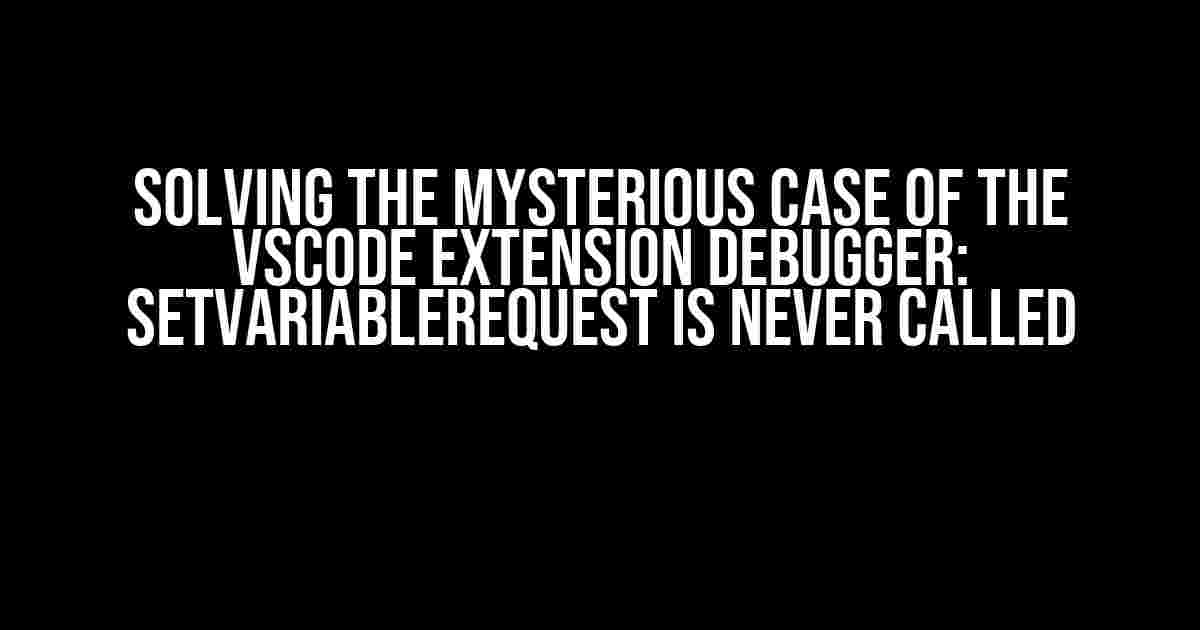Are you tired of scratching your head, wondering why your VSCode extension debugger is not working as expected? Specifically, are you struggling with the infuriating issue of the SetVariableRequest not being called? Fear not, dear developer, for you have landed on the right page! In this comprehensive guide, we will delve into the depths of the VSCode extension debugger, uncover the common pitfalls, and provide you with a step-by-step solution to get your SetVariableRequest working like a charm.
What is the SetVariableRequest?
Before we dive into the troubleshooting process, let’s take a moment to understand what the SetVariableRequest is and why it’s essential for our extension debugger. The SetVariableRequest is a part of the VSCode Debug Adapter Protocol (DAP) that allows the debugger to modify the values of variables in the target program. This request is crucial for debugging, as it enables us to inspect and modify variables in real-time, making it easier to identify and fix issues.
Common Causes of SetVariableRequest Not Being Called
Now that we’ve established the importance of the SetVariableRequest, let’s explore some common reasons why it might not be called:
- Incorrect Configuration: Misconfigured launch.json or settings.json files can prevent the SetVariableRequest from being called.
- Incompatible Debugger: Using an incompatible or outdated debugger can lead to issues with the SetVariableRequest.
- Missing or Incorrect Capabilities: Failing to specify the required capabilities in the launch.json file can prevent the SetVariableRequest from being called.
- Debug Adapter Issues: Problems with the debug adapter, such as incorrect implementation or missing functionality, can cause the SetVariableRequest to malfunction.
Troubleshooting Steps
Now that we’ve identified the common causes, let’s follow a structured approach to troubleshoot and resolve the issue:
-
Verify the Configuration
Review your launch.json and settings.json files to ensure they are correctly configured. Pay attention to the following:
- Verify the debugger type and version.
- Check theCapabilities section to ensure it includes the required features, such as the “variables” capability.
- Verify the breakpoints and variable settings.
-
Check the Debugger Compatibility
Ensure you are using a compatible debugger that supports the SetVariableRequest. You can check the debugger’s documentation or release notes to verify its compatibility.
-
Inspect the Debug Adapter
Investigate the debug adapter implementation to ensure it correctly handles the SetVariableRequest. You can do this by:
- Reviewing the debug adapter’s code and documentation.
- Using the VSCode debugger to step through the debug adapter’s code.
-
Manually Test the SetVariableRequest
Use the VSCode Debug Console to manually send a SetVariableRequest and verify the response.
debug.adapter.executeCommand({ command: 'setVariable', arguments: { variablesReference: 1, name: 'myVariable', value: 'newValue' } }) -
Review the VSCode Logs
Check the VSCode logs for any errors or warnings related to the SetVariableRequest. You can do this by:
- Opening the VSCode Developer Tools (Help > Toggle Developer Tools).
- Switching to the Console tab and filtering by “debugger” or “dap”.
Example Scenarios and Solutions
Let’s explore some example scenarios and their corresponding solutions to help solidify your understanding:
| Scenario | Solution |
|---|---|
|
The launch.json file is missing the “variables” capability. |
Add the “variables” capability to the launch.json file: |
|
The debug adapter implementation is incorrect. |
Review the debug adapter implementation and ensure it correctly handles the SetVariableRequest. Consult the VSCode DAP documentation and the debug adapter’s documentation for guidance. |
|
The VSCode version is outdated. |
Update VSCode to the latest version and try debugging again. |
Conclusion
Solving the mystery of the missing SetVariableRequest can be a challenging task, but by following the troubleshooting steps and reviewing the common causes, you should be able to identify and resolve the issue. Remember to:
- Verify your configuration and debugger compatibility.
- Inspect the debug adapter implementation.
- Manually test the SetVariableRequest.
- Review the VSCode logs for errors or warnings.
By mastering the art of debugging and understanding the intricacies of the VSCode extension debugger, you’ll become a more efficient and effective developer. So, the next time you encounter the SetVariableRequest issue, you’ll be well-equipped to tackle it head-on and get back to coding in no time!
Frequently Asked Question
Stuck with VSCode Extension Debugger SetVariableRequest and need some help? We’ve got you covered!
Why is my SetVariableRequest never called in VSCode Extension Debugger?
This might happen because the variableReference parameter is 0, which means the debugger doesn’t know which variable to update. Make sure to pass a valid variable reference to the SetVariableRequest.
How do I ensure that my VSCode Extension Debugger is properly configured to receive SetVariableRequest?
Double-check your launch.json file and make sure that the “request” attribute is set to “launch” and the “type” attribute is set to “pwa-node” or “node” depending on your debugger type. Also, ensure that you’ve installed the required debugger extensions.
Can I use SetVariableRequest with a multi-threaded debugger in VSCode Extension?
Yes, you can use SetVariableRequest with a multi-threaded debugger, but you need to specify the threadId in the request. This will ensure that the variable is updated in the correct thread context.
What happens if I pass an invalid variable name to SetVariableRequest in VSCode Extension Debugger?
If you pass an invalid variable name, the debugger will return an error response indicating that the variable does not exist. Make sure to handle this error scenario in your code to provide a better user experience.
How can I debug my VSCode Extension Debugger to see why SetVariableRequest is not working?
Enable the debugger’s verbose logging by setting the “trace” attribute to “verbose” in your launch.json file. This will help you identify any issues with your SetVariableRequest.


